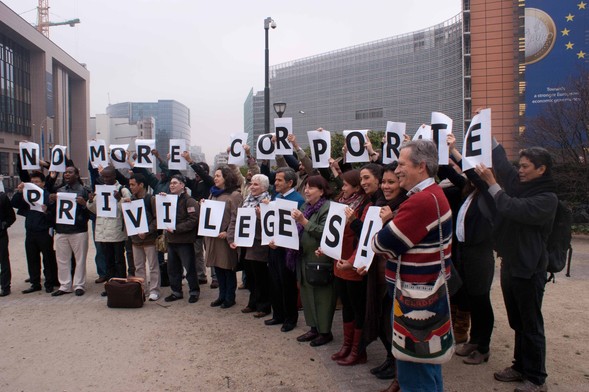There’s Still Time to Speak out Against the Trans Pacific Partnership Agreement
By Rev. Pamela Lupfer, Presbytery of Hudson River Joining Hands

Conrado Olivera, director of the Joinng Hands Peruvian network Red Uniendo Manos, (sixth from right, holding the letter “G”) attended and spoke on the La Oroya case conference on investor-state arbitrations that were held in Brussels, Belgium. Photo Courtesy of Red Uniendo Manos Peru.
A month after 12 nations reached final agreement on the massive Trans Pacific Partnership (TPP) trade deal on Oct. 5, 2015, the text of the agreement was finally released to the public.
The Presbyterian Church has long opposed the TPP based on our experiences with our mission partners throughout the world. Many faithful people worked tirelessly over the last several years to defeat Fast Track (Trade Promotion Authority), which is temporary authority granted to the U.S. President by Congress to negotiate international trade agreements where Congress can vote yes or no but cannot modify the details, however, the long battle ended in its passage. Now the clock is ticking for the final vote showdown on the TPP.
In the wake of our defeat over Fast Track, the tendency can be to become depressed, and feel hopeless that the battle is unwinnable given the overwhelming odds. But, like David fighting Goliath, we must not allow hopelessness to determine our fate and that of billions of people around the world.
Opposition to the TPP is mounting, as the details are finally open to scrutiny. The release of the final text shows that opponents had substantial reason to be concerned. The outcry has been loud and has come from all sectors of society – labor, environmental groups, family farmers, consumer groups, healthcare advocates, retired persons, the LGBTQ community, human rights activists, internet freedom advocates and the faith community.
Environmental groups warn the deal contains giveaways to polluters that will undermine the progress we have made in recent decades and would threaten the climate and wildlife with provisions that fail to meet even minimum standards.
Labor and human rights groups lament that it fails working families by forcing US workers to compete with those in countries where wages are as low as 65 cents an hour like Vietnam, as well as slave labor in Malaysia. In addition, it fails to address concerns about currency manipulation that costs American jobs by making it cheaper for companies to ship jobs overseas.
Food justice groups warn the TPP will flood food supplies with potentially unsafe foods from countries where food safety standards are lower and new provisions give companies the power to challenge the decisions of border inspectors.
Retired Americans and health care advocates are voicing concerns that the TPP would severely increase drug prices by keeping lower cost generic drugs off the market, further enriching the pharmaceutical industry.
Congress is expected to vote on the agreement in early 2016 and opposition groups have been mounting widespread protests throughout the US and most of the TPP signatory countries. Things heated up this fall with numerous protests across the country and around the world: in September at the UN Sustainable Development Summit, and in October in Congressional districts across the US coinciding with the Congressional recess, and in November a national mobilization was organized in Washington, DC to demand global justice with multiple protests over five days.
There is still time to make your voice heard with your members of Congress!
What Can You Do?
- Become Informed.
Visit www.pcusa.org/trade
Learn about the PCUSA’s stance on The Trans-Pacific Partnership Agreement
Read Initial Analysis, Secret TPP Text Unveiled: It’s Worse than We Thought
Read Investors have controversial new rights to sue countries. Here’s why this matters for the U.S.
- Call or write you Congressperson and urge them to vote No when the TPP comes up for a vote.
- Write a letter to the editor of your local newspaper. Click here for letter writing tools.
- Join with other church members or the mission committee of your church or presbytery to pass a resolution opposing the TPP. Both Hudson River and Giddings-Lovejoy presbyteries passed resolutions.
- Ask your local government to pass a resolution opposing the TPP.
![]() You may freely reuse and distribute this article in its entirety for non-commercial purposes in any medium. Please include author attribution, photography credits, and a link to the original article. This work is licensed under a Creative Commons Attribution-NonCommercial-NoDeratives 4.0 International License.
You may freely reuse and distribute this article in its entirety for non-commercial purposes in any medium. Please include author attribution, photography credits, and a link to the original article. This work is licensed under a Creative Commons Attribution-NonCommercial-NoDeratives 4.0 International License.